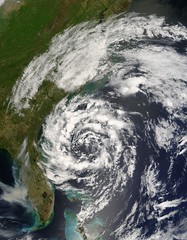 Due to climate change our seas and oceans are getting warmer. And now scientists have confirmed that a warmer temperature in the waters will create stronger storms, such as Katrina in 2005 and the more recent hurricane Ike.
Due to climate change our seas and oceans are getting warmer. And now scientists have confirmed that a warmer temperature in the waters will create stronger storms, such as Katrina in 2005 and the more recent hurricane Ike.
Satellite data has shown that during the last 25 years "strong cyclones, hurricanes and typhoons have become more frequent in most of the tropics". But according to the scientists, who published their findings in the journal Nature, the strength of weaker storms have not been "noticeably altered".
But the scientists also calculated that only a 1C rise in sea surface temperature will increase the amount of strong storms by about one third. More controversial, some scientists warn that a warmer sea temperature will not just create stronger storms but also increase their numbers.

Recommended Comments
Join the conversation
You can post now and register later. If you have an account, sign in now to post with your account.